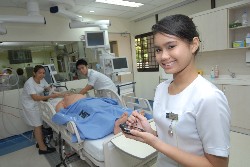Student nurses get realistic training

Nursing education is going high-tech, at least for one group of student nurses in Singapore.
Ngee Ann Polytechnic set up in July a Patient Simulation Center to enhance the learning experience of student nurses.
Built at a cost of S$1.4 million (US$918,639), the new facility includes two intensive care units, two emergency rooms and four manikins costing S$80,000 (US$52,499) each. It also houses an operating theater complete with gases typically used in surgeries, a gerontology unit, and a neonatal intensive care unit.
 Students get a dose of reality |
Dr Phang Chiew Hun, director of Ngee Ann's School of Health Sciences, said in a statement: "The Patient Simulation Centre is a vital component of our nursing curriculum. We can simulate all kinds of scenarios, including rare situations which the students may not encounter during their clinical attachments."
Emphasizing the importance of realistic nursing training, Phang added: "The manikins are life-like, they can do everything except eat and sweat. In perfecting their skills on these 'patients', our students will get over any fears of handling different medical conditions, including critical ones such as respiratory failure and cardiac arrest."
|
Handy helpers
Ngee Ann has also embarked on a pilot project with the aim to foster a new generation of tech-savvy nurses.
From August 2006 to February 2008, the polytechnic's final-year student nurses will be able to access course materials using Acer N300 personal digital assistants (PDAs).
Study materials have been reformatted for the small palm-sized devices, and thanks to the use of animation and video, students can look forward to more vivid illustrations and explanations of complicated concepts and processes.
Several applications have also been specially designed to enhance student learning. These include the Mobile Translator, which allows students to check the pronunciation of commonly used words in various Chinese dialects, and an electronic logbook which helps keep track of the skills they have mastered.
Ngee Ann is confident the new PDA project, partly funded by the Lien Foundation in Singapore, will boost the image of the nursing profession.
Phang said: "We hope this interesting high-tech approach will induce more young Singaporeans to take up nursing as a career, thus easing the manpower shortage in this area."
The polytechnic plans to review the project at the end of the pilot trial to fine-tune the system, before extending the scheme to all course students.